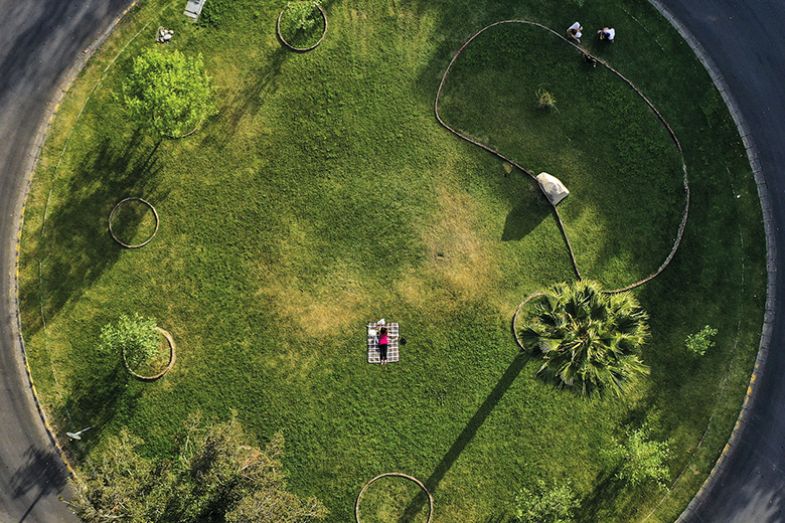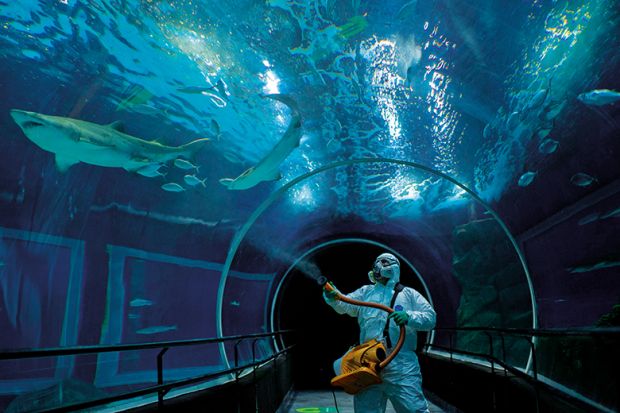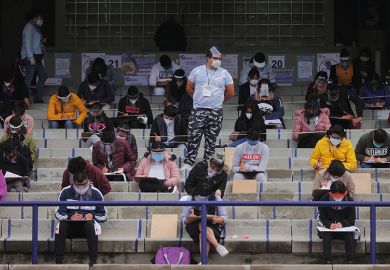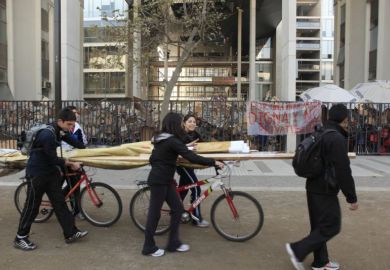Browse the Latin America University Rankings 2021 results
When commentators depict science and research systems in Latin America, the picture is frequently bleak. Lack of funding and resources, a brain drain and high levels of bureaucracy are among the most cited challenges for higher education in the region.
A key question over the past year has been whether the Covid-19 pandemic will change this landscape for the better or the worse.
“It’s very paradoxical,” says Alma Maldonado, a higher education researcher at the Center for Research and Advanced Studies at Mexico’s National Polytechnic Institute.
“On the one side, science has been so relevant during the pandemic…and scientists have won some recognition for their work. On the other, there are constraints with the budget, and there is not enough money to finance everything.”
But many researchers conclude that it is the gloomier scenario that will prevail.
Fernanda Estevan, associate professor at the São Paulo School of Economics, says, “Brazil’s fiscal situation has been very difficult since at least 2014. Then the pandemic only made things worse.”
For example, the government has frozen the hiring of public-sector employees, including academics at federal universities, to help fund its pandemic relief package, a move that is already having an impact on the country’s research output, Estevan says.
Meanwhile, Andrés Zahler, associate professor and director of the School of Commercial Engineering at Diego Portales University, says that in Chile, “short-term needs have exploded” as a result of the Covid crisis. Science and technology, however, is best supported by long-term policies, he adds.
But the pandemic is not the only development that academics fear will weaken the region’s research system.
Download a free copy of the Latin America University Rankings 2021 digital supplement
In Mexico, the government is making several legislative changes that scholars say will further reduce research funding, limit their influence in future science policy and curtail academic freedom.
Last year, the administration of President Andrés Manuel López Obrador, known as Amlo, pushed through legislation eliminating 109 semi-independent “trust funds”. The funds are valued at about Ps68 billion (£2.4 billion), about a third of which is dedicated to science and research.
The funds were created to ensure sustained funding for specific programmes, including major research projects, student scholarships and maintenance of research equipment. But the government will now administer the money directly, making the funding dependent on yearly budget appropriations. The president said the money was needed to support the country’s response to the pandemic.
The Mexican government is also proposing a controversial new science bill. Maria Brenda Valderrama Blanco, a biotechnology researcher at the National Autonomous University of Mexico (UNAM) and one of the founding members of ProCienciaMx, a network of scientists seeking to influence science policy, says the legislation makes no mention of basic science and says nothing about the scientific community’s involvement in the establishment of research priorities and the evaluation of research. Instead, research priorities will be decided by a single government committee, led by the president. The bill also removes the target to invest 2 per cent of gross domestic product in science and technology and no longer includes any details about the mechanisms for financing research projects, she adds.
“So, there is no obligation to invest. And even if they want to invest, there is no structure to invest – no instrument, no funding calls, nothing. It’s like an empty basket,” she says.
“The government says: ‘You have research freedom, you can do your research in whatever field you feel like, but there will be funding only for our priorities. Also, there will be no funding for regional and local projects, only national projects.’”
The academic community has responded to the proposed legislation with its own draft of a new science bill, and one or two other alternative versions are expected to be filed in the coming weeks, Valderrama says. Her hope is that the bills will at least be discussed in Congress – something she says has so far not been the case under the Amlo administration.
“In the past three years, every law has been passed without discussion. The government sends the bills and the chamber passes them without changing a single comma,” she says.
“If the [government’s] science bill goes through without changing a single comma, the viability of research in Mexico will disappear. There will be no research freedom, no funding of basic science, no instruments for different priorities, no discussion, no evaluation. It’s an anti-scientific bill.”
Valderrama adds that if the bill becomes law, it may take 20 to 30 years “before we have a majority [supporting us] in the Congress, and the majority agrees to prioritise a science bill” to reverse the changes.
“Science is not very important in Mexico, from a political point of view,” she says.

Scholars in Brazil are also victims of an anti-science government. Jair Bolsonaro’s administration cut the Science Ministry’s investment budget by 34 per cent this year, while the country’s top federal funding agency, the National Council for Scientific and Technological Development, is expected to have fewer resources for research grants. Bolsonaro (above) had previously pledged to increase spending on research and development from 1 per cent to 3 per cent of GDP, but this has so far not materialised.
There is also a great deal of uncertainty in Brazilian academia, with the administration already on its third education minister since it came into power in January 2019 (not including the appointment of one minister who resigned before taking office over inconsistencies relating to academic credentials in his CV).
São Paulo’s Estevan says an increasing number of researchers are relocating to universities abroad because of worsening research conditions in Brazil.
“We are constantly receiving new directions and instructions,” she says, citing a change in the way scholarships are allocated for master’s and PhD students and a potential adjustment in the way postgraduate programmes are ranked, and therefore funded, as two recent examples. She adds that these policy shifts are often sudden and confusing, without clear explanations of either their rationale or their implications.
“It would already be difficult with the pandemic and with the fiscal situation, but having a government that is so anti-science and anti-knowledge has only made things worse,” Estevan says.
Other countries in the region are more welcoming of science ideologically, but academics say there has been little progress in practice. Chile, for example, established a Ministry of Science for the first time in 2018, but it has not yet delivered on its promise to make research better funded and prioritised, while in Argentina, as in many other Latin American countries, spending on R&D as a share of GDP has barely changed in 20 years.
Chile’s Zahler, an expert on science, technology and innovation policy, says that since the Ministry of Science was established, the science budget has actually decreased in absolute terms, and there is still no “political will from the top level of government for this small ministry to push research in a stronger way”. He adds that the institutions that are overseen by the ministry “are relatively weak in terms of administrative capacity, because of very low budgets [that make it hard for them] to hire good people, to keep them, to develop knowledge and to do better policies”.
“I would say the Ministry of Science is a promise yet to be fulfilled,” he says.
However, the country is in the process of drafting a new constitution, which will be voted on in a referendum next year, and Zahler is hopeful that this will increase the relevance and impact of academic research.
“It is a big opportunity to put knowledge, science and innovation more at the centre of our constitution and to think about how…we can develop into a stable and strong country for the future,” he says.
High up on Zahler’s wish list is the appointment of chief scientific advisers in government departments.

In neighbouring Argentina, Rodolfo Barrere, coordinator of the Network for Science and Technology Indicators for Ibero-America and Inter-America, says the country’s research system is “quite big in terms of human resources by Latin American standards, but not so well developed in terms of financing resources”.
In 2019, there were 2.91 researchers per 1,000 people employed in Argentina (compared with a regional average of 1.23), but Argentina’s expenditure on R&D was just 0.49 per cent of GDP (compared with 0.58 per cent across Latin America).
Barrere adds that low levels of research in Argentina’s business sector, as is the case in other developing countries, are preventing the nation from reaching its target of investing 1 per cent of its GDP on R&D. Just 20 per cent of the expenditure on R&D in Argentina comes from industry, compared with 62 per cent in the US, 41 per cent in Canada and 36 per cent in the Latin American region as a whole.
“Some of our universities are very well developed in R&D and engaged in international networks, and there are cases where they try to engage with the business sector; but there is not a demand there, so it’s very hard to achieve,” Barrere says.
Mexico’s Maldonado says one of the issues with higher education development in Latin America is that policymakers tend to present a false dichotomy between focusing on world-class, international research and prioritising local and regional science.
“Either we want to be part of the worldwide production of research, and then policies tend to push scholars to publish in English and in journals with impact and to produce patents. Or we push to strengthen our own system, increase publications in Spanish, and we don’t care about what the world is doing,” she says, adding that a “more creative” alternative would be to try to make progress in both areas.
Whatever changes are made, Latin American experts appear to be unanimous that increasing university and research investment is crucial to the region’s prosperity.
“If we want the country to thrive, there is no alternative other than to invest in technology, invest in science,” says Chile’s Zahler. “If we don’t do this, the country will be stuck in a very low level of growth. At the pace we are going, it will take 100 years for Chile to become an innovative country.”
POSTSCRIPT:
Print headline: A sinking feeling
Register to continue
Why register?
- Registration is free and only takes a moment
- Once registered, you can read 3 articles a month
- Sign up for our newsletter
Subscribe
Or subscribe for unlimited access to:
- Unlimited access to news, views, insights & reviews
- Digital editions
- Digital access to THE’s university and college rankings analysis
Already registered or a current subscriber?








